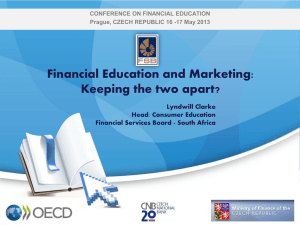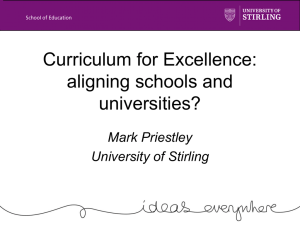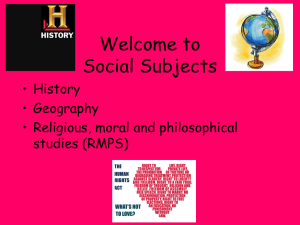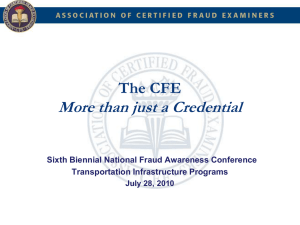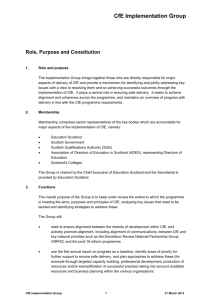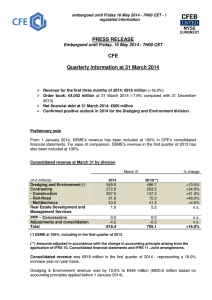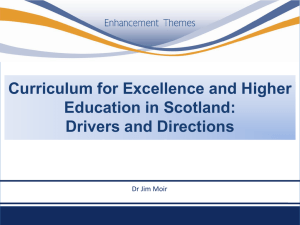University Engagement with Curriculum for Excellence
advertisement
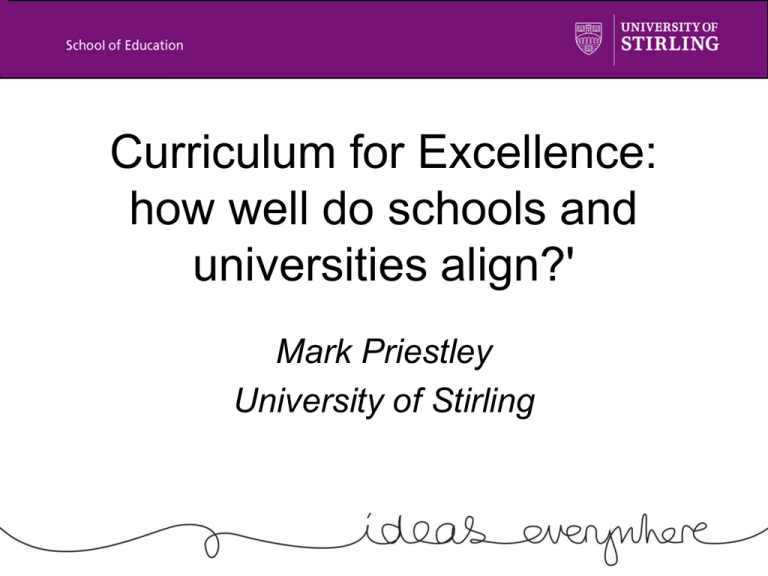
Curriculum for Excellence: how well do schools and universities align?' Mark Priestley University of Stirling A fair assumption? • According to Beyond the Senior Phase: “The approaches to learning and teaching and the skills emphasised in CfE are, in many respects, bringing schools in line with those already in place or being developed within universities.” (Universities Scotland 2012, p.13) • According to a 2013 statement from Universities Scotland: “The changes within Scotland’s schools will soon produce university applicants who may have had different educational experiences from previous cohorts. This has implications for higher education institutions in terms of both admissions requirements and also how learning and teaching is delivered.” Questions • To what extent is CfE actually transforming the landscape of schooling? – Is it really leading to changes in the sorts of student arriving into university first year programmes? • Where, and to what extent do universities need to change their practices to accommodate the CfE student: – In terms of admissions/accessibility? – In terms of the way we teach in universities? Graduate attributes Knowledgeable and skilled within and between the disciplines Possess a breadth of knowledge derived from engagement with several subject areas; Have a command of an appropriate body of knowledge in their chosen discipline(s), encompassing understanding and application of key concepts and techniques together with the necessary skills to do so effectively; Possess Information handling skills to seek, evaluate, manipulate and present data using appropriate technologies; Understand how to frame and re-frame research questions. Employable and confident Possess individual initiative, be confident, have self-esteem and the ability to cope with change; Possess the quality of being an employable graduate, be professional competent and demonstrate ethical practice; Empowered by the Stirling Experience to reach their full potential, ‘be all they can be’; Have the option to experience networking with Stirling Alumni and others. Critically and intellectually curious thinkers Active global and local citizens Possess critical, analytical and problem Possess awareness of, and demonstrate solving abilities; sensitivity towards social, cultural and Be self-reflective, research minded and global diversity; intellectually curious; Community minded both at local and Possess a capacity for systematic enquiry international levels; and independent thought; Access to a diverse range of international Possess the skills and attitudes required for a researchers and scholars. lifetime of independent learning, personal and professional development. Source: http://www.stir.ac.uk/employability/staff/components-of-employability/graduate_attributes/ CfE’s Four Capacities CfE – a radical agenda? • Active learning – ‘New’ practices: cooperative learning; formative assessment; practicals; fieldwork; enquiry-based learning • Interdisciplinary learning – Hybrid subjects; rich tasks; cross-curricular themes; the BGE • Focus on skills/competencies – Literacy; numeracy; ICT; political literacy • Independent learning – ‘Responsibility for own learning’; pupil questioning; enquiry; metacognition • Deep learning/understanding – ‘Decluttering’ – Reducing the tyranny of the test So far, so good…. [Re]contextualisation • Successive [re]interpretation of policy has led to mutations and confusion within CfE HMIe ‘guidance’ 2007-10 2004 A CfE BTC series LA ‘guidance’ School practices BTC summaries e.g. assessment 2007 – E&Os not assessment standards 2010 – BTC 5; local authority levels within levels Tensions within the CfE model CfE as a process curriculum • Making sense of big ideas • Developing ‘fit for purpose’ practices: – Powerful knowledge – Powerful pedagogies CfE as an outcomes curriculum • Auditing existing practice against outcomes – Tweaking – Tick-box approaches – Incremental/piecemeal change ‘Amnesia and déjà vu’ (Priestley and Humes, 2010) Teacher agency “Within a clear framework of national expectations, teachers will have greater scope and space for professional decisions about what and how they should teach, enabling them to plan creatively within broader parameters”. (Scottish Executive Education Department, 2006) • Teachers expected to be agents of change • Big push to raise teacher capacity – Donaldson review – Teaching as a Master’s profession – New GTCS teaching standards – professional enquiry • But can teachers be agentic in curriculum development? A balancing act? (Leat, Livingston and Priestley, 2013) Input regulation • Policy seems to reduce input regulation. • But – National guidance helps frame discourses around education • Continued framing of curriculum around old domains of knowledge • Teachers adopt the technical language of policy – Variation between local authorities • Hierarchical nature of Scottish education – “You just do a good job. You try your best. You do not muck around. You do not do things you should not do or challenge superiors in a way unless it’s obviously something genuine”. • Mandatory teaching materials and procedures in many authorities • Macro level policy reduces input regulation, but systemic features maintain it in many cases Output regulation (1) • Statistical use of attainment data – Standard Tables and Charts (STACS) • Comparison of teachers across secondary schools – Assessment of performance against curriculum outcomes • Comparison of primary schools – Comparator league tables • Comparison of ‘similar’ schools • Mission creep in assessment – Curriculum for Audit? – Recent guidance on reducing bureaucracy – New benchmarking tool planned. • But will it make a difference? Bureaucracy “Living thru the paperwork nightmare that is strangling good CFE learning n teaching! You want 2 see N4/5 assesm” (Twitter, November 2013) Assessment driven curriculum The profound problem with CfE in secondary schools is teachers' realisation that the exact opposite of these intentions is the reality of where Scottish Qualifications Authority National assessments are forcing teachers to go ….. the demands of the new National Levels 4 and 5 since last August have led to a narrower experience for my present cohort than for any in the past 40 years. The introduction of so-called UASP assessments consume far too much time that would be better used in consistent teaching and learning. (letter to The Herald, 25 March 2014) Output regulation (2) • External inspections – School inspections – HMIe • Revamped in 2006-7, but ‘cosmetic, since the basic instruments and methodology remain the same’ (Reeves, 2008) • Further changes recently – greater focus on self-evaluation • But continue to be high-stakes events associated with performativity – Local authority audits • Shift since late 1990s from a supportive advisory role to a quality improvement role • Mirrors inspection processes • High emphasis on accountability and evidence The balance between input and output regulation (Leat, Livingston and Priestley, 2013) Implications for teacher agency • Over-emphasis in policy on the role of the individual teachers: – Through extending teacher autonomy • Raising capacity through CPD • Exhorting teachers to be agents of change • A continued focus on output regulation acts against such aspirations – – – – a set of social structures (systems, power relations, roles, etc.) cultural expectations about what is possible a practical issue (what is actually possible) and an evaluative issue (how professionals judge aspects such as risk) ..and curriculum development? • Most Scottish schools are improving in response to CfE. • But, output regulation potentially impacts radically on the possibilities for teacher agency – by enabling or precluding particular practices – undermining professionals’ ability to take responsibility for their work • Purposes of CfE trumped by more instrumental imperatives: – Inspections – League tables – University entrance Losing sight of the big ideas • The result: – Many new practices adopted to tick the box rather than for curricular purposes. Performative cultures (playing the game, teaching to the test, fabrication: see Keddie, 2013) – Change tends to be incremental and piecemeal – Narrowing of the curriculum – Continued emphasis on testing and attainment – Lack of fit between curricular purposes and curricular practices • Potentially: – Students ill-equipped for the worlds of work, university and for democratic citizenship Articulation between school and university • If CfE develops as intended: – “The approaches to learning and teaching and the skills emphasised in CfE … [will] … bring schools in line with ….. universities” • But – Still considerable progress to make – Some of this needs to come from the university sector Implications for pedagogy • Seminars – Dialogical learning? Or a 2 hour lecture? – Structured approaches (e.g. cooperative learning) • The traditional lecture. – ‘Listen again’? – Purpose (Interactivity? Information giving?)? • E-learning – VLEs, blogs, social media, etc. • Independent learning – Structured inquiry? Or laissez-faire? • Teaching skills – Training – Teaching qualifications Implications for Assessment • Variety? – – – – – Less emphasis on written essays and reports? Group assessments? Continuous assessment? Peer- and self-assessment? Greater emphasis on the formative role of assessment? • Dangers: – – – – Loss of rigour Hitch-hiking Reliability Expertise Implications for admissions “University leaders affirm that they continue to be committed to fair admissions policies and that these will allow equal consideration of candidates who possess the necessary knowledge and skills base irrespective of what routes they may have taken through the Senior Phase.” (Universities Scotland 2012, p9) • Good intentions, but still work to do: – – – Continued emphasis on 5 Highers in one sitting More emphasis on Advanced Higher needed Greater importance to alternative routes needed Assuming that CfE is changing the nature of the university applicant … • While universities already align well with CfE: – Continued work needed to upgrade university pedagogy – Continued work needed to reform admissions • Universities are part of the ecology that drives the practices of schooling. – Persistence of ‘elitist’ admissions criteria may impede the development of CfE in schools References • • • • • Leat, D., Livingston, K. & Priestley, M. (2013). Curriculum deregulation in England and Scotland - Different directions of travel? In W.Kuiper & J. Berkvens (Eds.), Balancing Curriculum Regulation and Freedom across Europe, CIDREE Yearbook 2013. Enschede, the Netherlands: SLO. Keddie, A. (2013). Thriving amid the demands of the contemporary audit culture: a matter of school context. Journal of Education Policy, 28[6], 751-766. Priestley, M. & Humes, W. (2010). The Development of Scotland's Curriculum for Excellence: amnesia and déjà vu. Oxford Review of Education, 36[3], 345-361. Scottish Executive (2006). Curriculum for Excellence: progress and proposals. Edinburgh: Scottish Executive. Universities Scotland (2012). Beyond the Senior Phase: University Engagement with Curriculum for Excellence. http://www.universitiesscotland.ac.uk/uploads/USBeyondtheseniorphaseCfEMay2012.pdf.
